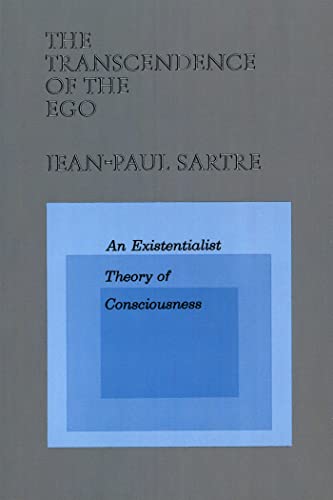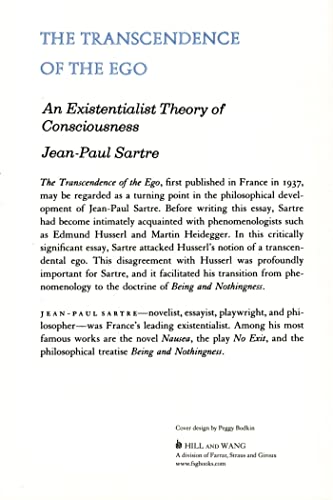Sobre nosotros
Servicios al cliente
Atención al cliente
Acceso Regional
Legales y políticas
Obtén la aplicación

Apunta tu cámara para descargar la aplicación
Copyright © 2024 Desertcart Holdings Limited



The Transcendence of the Ego: An Existentialist Theory of Consciousness
J**S
Good but needs a background understanding.
Sartre wrote this earlier in his career but you still need a little understanding of phenomenology to get what he's trying to say.
S**D
Five Stars
Deep thinking and rewarding.....if you want to spend a little time pondering beyond the mundane, this is for you.
J**M
Five Stars
It is a great prelude for "being and nothingness"
T**S
Fast and Good!
I ordered this book used on the fist day of classes, and I had it in a week in great condition.
Z**S
Five Stars
great book!
J**Y
The turning point in the thought of Sartre
The Transcendence of the Ego is Sartre's refutation and response to the phenomenology of Edmund Husserl and his idea that a transcendental ego stands behind consciousness. Reading Being and Nothingness is tremendously aided by this short work, and the thought inside is tremendously exciting, because Sartre refutes solipsism and finally brings consciousness outside into the world. This book is highly recommended to those interested in Existentialist Philosophy.
A**R
An Existential Classic
The Transendence of the Ego is the heart and soul of Sartre's philosopy. It is a classic and a must for anyone who wants to delve deeper in his/her understanding of Sartre's other philosophical views. It is a wonderful thesis, more or less an expanded introduction to Being and Nothingness.
M**N
Short work - easy intro to Sartre’s philosophy
One of Sartre’s first systematic philosophic monographs. In this, he is still explicitly a member of the phenomenological school, but starting to forge a new path based on a rejection of Husserl’s later works, namely Cartesian Meditations, although he does not yet call it ‘existentialism’.Husserl, to simplify, had developed a position based on a perceived need for a transcendental ‘ego’ or subject to integrate experience. Sartre wanted to avoid this turn, and maintain the same focus on human freedom and free will without such recourse. In reality, in my view, he re-creates the same problems that Husserl wanted to solve. It is worth noting that Sartre is even more committed to Husserl’s rejection of ‘psychologism’ than Husserl himself, because of the increased popularity of depth psychological and subconscious explanations for human cognition. As is well known, Sartre felt that if we are pure Id-machines, we cannot be free.Sartre’s position is that consciousness is purely ‘of the moment’, without anything subjective and certainly subconscious, and from a phenomenological point of view can be analysed in the same way as anything object. The Ego, the I, the Subject, these do not exist except as reflective objects, in much the same way as in phenomenology we bracket out questions of the transcendent ‘object’ seen from all sides.In this sense, this short work is the first expression of Sartre’s solution to the problem of determinism/free will, which is really the critical ethical problem of Kant reformulated (either we are bound by space and time, and physical causality, in which case we are not free, or we are outside space/time/causality in which case our freedom is of such a transcendental nature as to be almost mystical). Sartre’s solution is that what he here calls consciousness (as opposed to Ego) is radically based on Nothingness (as in Being and Nothingness) and so therefore is a radical form of transcendent non-determinism. Intriguing though it is, and will form the basis of B&N later, it does appear to be another ‘negative’ or Hegelianised variant on Cartesian Dualism. As often in the 20th century, you are a Kantian or a pre-Kantian, and it’s only really Deleuze - with his plane of immanence - that tries to successfully tackle this problem. This is largely why the entire project of phenomenology and existentialism is deemed to have ‘failed’.Two things of interest to note. Sartre does seem to anticipate in ways worth exploring recent developments in cognitive science, namely the notion of the ‘global workspace’ - Sartre’s view of consciousness appears to share a lot with the ‘spotlight’ model of our inner life. Secondly, it’s interesting to me that Sartre seems committed to some of his lifelong philosophical positions (freedom, free will,anti-psychologism) BEFORE he had developed the system to justify them.
S**D
Quality Book
Quality Book (Remark: often deliveries from Amazon, who uses DHL, is sent to the wrong address, and I have to follow up DHL by phone, to redirect the delivery, or else I will not receive it. I suggest that Amazon and Amazon's subcpntractors, including in Polan, stop using DHL)(Stein Smaaland ([email protected])
S**S
Iconic Sartre work.
One of the best foundations for Sartre's phenomenology. This essay begins Sartre's study and hybridisation of phenomenology and ontology. This is a must buy for anyone interested in this field, especially for Sartre because of how unique and important it is.
Trustpilot
Hace 2 semanas
Hace 2 semanas